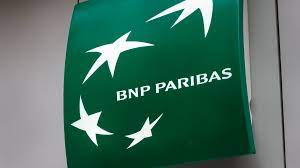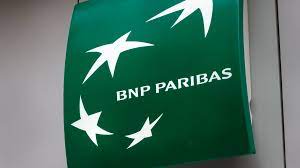
BNP Paribas, a French bank, posted a better-than-expected profit in the second quarter as bad loan charges fell and activity remained strong in both investment and retail banking, despite volatile global markets and an economic downturn.
The net income of France's largest listed lender increased 9.1 per cent year on year to 3.2 billion euros ($3.25 billion) on Friday. According to an informal consensus projection circulated among analysts, net income would be around 2.7 billion euros.
BNP shares rose more than 4 per cent in morning trading, surpassing the European banking market, which rose at almost half that rate.
Revenues increased by 8.5 per cent to 12.78 billion euros, outpacing operational expenses, which increased by 7.6 per cent to 7.72 billion euros.
"There's a positive 'jaws effect'" with revenue growth outpacing expenses, noted Arnaud Journois, a credit analyst for DBRS Morningstar.
"But while these results are good, it doesn't mean that the outlook has improved," he added, pointing to the provisions taken by the bank to cover potential losses on loans should the euro zone economy deteriorate further.
"It's possible that the third and fourth quarter won't be as good for European banks," he cautioned.
This week, Europe's lenders surprised investors with strong profit surprises, but investors are looking for signals that a weakening economy, rising prices, and the crisis in Ukraine could harm their prospects. However, BNP's cost of risk - money set aside for failed loans - was 789 million euros in the second quarter, around 100 million less than analysts' average projection.
Revenues in the section home to retail banking increased by 11.1 per cent, while revenues in investment banking increased by 10.6 per cent.
With financial markets facing one of the worst first six months in living memory, demand for financial instruments increased significantly, according to the bank.
Demand was "driven in particular by reallocation and hedging needs in rates, currency, emerging markets, and commodities derivatives products," according to the firm, which also noted a "strong level of activity overall on stock markets, notably in derivatives."
Fixed-income, currency, and commodities trading revenue increased by 14.8 per cent in the quarter, while equity trading revenue increased by 16.1 per cent.
The French bank's aim to acquire market dominance in that industry was highlighted last week when Ashley Wilson, the global head of prime services, quit after joining from Deutsche Bank only a year ago.
Citi analysts noted a modest fall in the crucial CET 1 capital ratio from 12.4 per cent to 12.2 per cent, and stated that while a short-term lift for BNP shares could be expected, visibility remained low.
"We expect the market to have a positive initial reaction to these numbers, but to have questions on the 2022/23 outlook, the development of asset quality/provisions, capital trends, sensitivity to macro developments, trend in AM (asset management), growth and capital return", they wrote in a note.
(Soiurce:www.usnews.com)
The net income of France's largest listed lender increased 9.1 per cent year on year to 3.2 billion euros ($3.25 billion) on Friday. According to an informal consensus projection circulated among analysts, net income would be around 2.7 billion euros.
BNP shares rose more than 4 per cent in morning trading, surpassing the European banking market, which rose at almost half that rate.
Revenues increased by 8.5 per cent to 12.78 billion euros, outpacing operational expenses, which increased by 7.6 per cent to 7.72 billion euros.
"There's a positive 'jaws effect'" with revenue growth outpacing expenses, noted Arnaud Journois, a credit analyst for DBRS Morningstar.
"But while these results are good, it doesn't mean that the outlook has improved," he added, pointing to the provisions taken by the bank to cover potential losses on loans should the euro zone economy deteriorate further.
"It's possible that the third and fourth quarter won't be as good for European banks," he cautioned.
This week, Europe's lenders surprised investors with strong profit surprises, but investors are looking for signals that a weakening economy, rising prices, and the crisis in Ukraine could harm their prospects. However, BNP's cost of risk - money set aside for failed loans - was 789 million euros in the second quarter, around 100 million less than analysts' average projection.
Revenues in the section home to retail banking increased by 11.1 per cent, while revenues in investment banking increased by 10.6 per cent.
With financial markets facing one of the worst first six months in living memory, demand for financial instruments increased significantly, according to the bank.
Demand was "driven in particular by reallocation and hedging needs in rates, currency, emerging markets, and commodities derivatives products," according to the firm, which also noted a "strong level of activity overall on stock markets, notably in derivatives."
Fixed-income, currency, and commodities trading revenue increased by 14.8 per cent in the quarter, while equity trading revenue increased by 16.1 per cent.
The French bank's aim to acquire market dominance in that industry was highlighted last week when Ashley Wilson, the global head of prime services, quit after joining from Deutsche Bank only a year ago.
Citi analysts noted a modest fall in the crucial CET 1 capital ratio from 12.4 per cent to 12.2 per cent, and stated that while a short-term lift for BNP shares could be expected, visibility remained low.
"We expect the market to have a positive initial reaction to these numbers, but to have questions on the 2022/23 outlook, the development of asset quality/provisions, capital trends, sensitivity to macro developments, trend in AM (asset management), growth and capital return", they wrote in a note.
(Soiurce:www.usnews.com)














